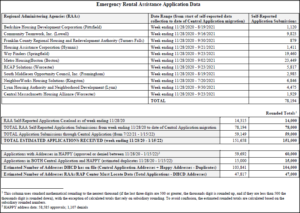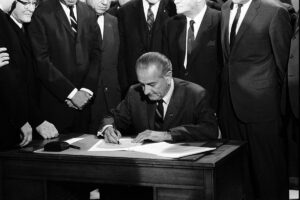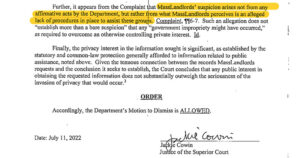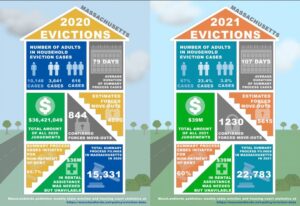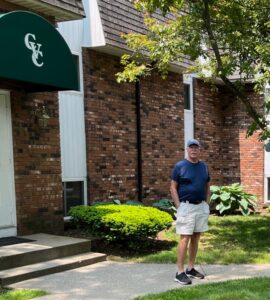Supreme Judicial Court (SJC) asked to Hear Public Records Case
| . Posted in News - 2 Comments
On Monday, Dec. 18, MassLandlords Legislative Affairs Counsel Peter Vickery asked the Supreme Judicial Court to consider our request to see rental assistance records. In legal terms, this action was "an application for further appellate review (FAR)." We are in litigation against the Executive Office of Housing and Livable Communities. The application for FAR follows our loss of appeal in late November. A panel of three justices decided we couldn't see the records.
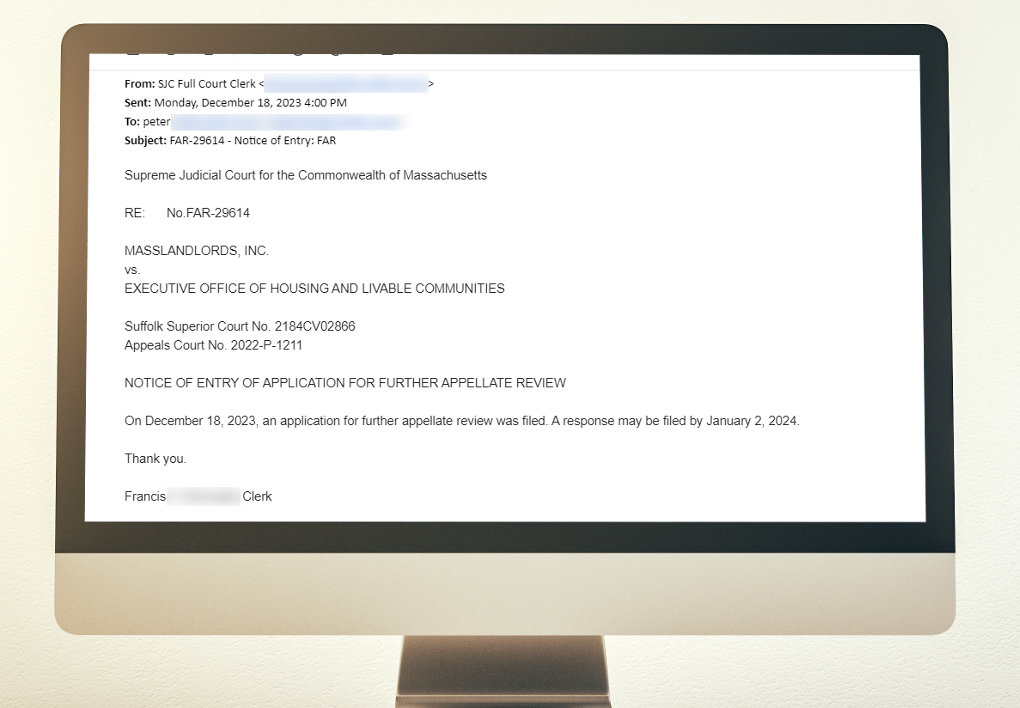
We actually don't have a computer this nice looking, but we wanted to show you the email confirming submission and it was boring by itself. The response deadline of January 2 was expected to be extended by state request. Derivative of Licensed 123rf.
At issue is whether the commonwealth or any department can spend $800 million without telling anyone where it was spent. More importantly, we want to know where it was not spent: where applications were "timed out" or denied. MassLandlords has requested a spreadsheet showing application date, address and status (whether approved, denied or "timed out") for all pandemic rental assistance.
Anecdotally, we know of hundreds of cases in which landlords and renters submitted all required information but had their applications "timed out" because the state lost the attachments. Additional cases were timed out for failure to submit what was perceived by applicants as unnecessary information.
We have been sensitive to the possible privacy implications from the beginning. Our original request specifically did not ask for renters’ names. We provided an affidavit from a Brown University researcher confirming that our intended investigation could be conducted without knowing or discovering the identity of any applicant.
"Failure to State a Claim"
The state moved to dismiss the case without a hearing. Their official reason was "failure to state a claim." The Superior Court granted the motion. The appeals court sustained the dismissal. In essence, the courts' positions so far have been akin to saying that there is no conceivable public interest in the requested information.
In moving to dismiss, the state filed an affidavit from Amy Stitely, Chief of Programs. This inadvertently showed that there is enormous public interest: the state had lost to supervision 47,000 of the 151,000 applications for pandemic rental assistance received as of January 2022. These were presumed printed out and sitting in boxes at the regional administering agencies. The cost of finding all of these and notifying application holders was estimated at roughly $200,000 plus internal labor. (For context, the state hired an antifraud contractor to examine 10% of applications for $800,000.)
Evidence of Discrimination Not Required, But Present
In addition to the issue of time outs, MassLandlords had previously presented the court with four examples of prima facie evidence of unlawful discrimination.
First, the applications required listing all children in the premises. This was discrimination on the basis of family status, especially because in early applications this information was not used. (Information about children was used only in later months to help determine eligibility faster.)
Second, early applications required applicants to speak English. Months later, applications still favored English by hiding awkward Google-translated versions behind English-only web pages. (For example, Spanish language applicants in Andover were unable to find their town in the dropdown menu because it had been translated as "Y más", meaning, "and over again." "Chesterfield" became "el sofá," after the brand.) This was inadvertent discrimination on the basis of national origin.
Third, early applications required essays describing Covid's impact. This was discrimination on the basis of disability.
Fourth and finally, we provided a City Life/Vida Urbana study conducted using our own MassCourts data showing that evictions, in general, land hardest on people of color. This demonstrates systemic disparate impact on the basis of race.
Applicants unable or fearing themselves unable to pass such limiting applications were unlawfully "timed out" and barred from the help to which they were otherwise entitled. To the extent funds were in limited supply, a lottery would have been more equitable.
The public records law (Chapter 4 Section 7) gives only three instances in which addresses are exempt from scrutiny: state and city employees, their family (e.g., for dependents named in health insurance plans) and firearms holders (presumably to prevent facilitating theft).
Balancing Test Required
The Supreme Judicial Court established a three-part test for record requests in the 2019 case Boston Globe Media Partners v. Dept of Public Health. This test was designed to balance privacy vs. public interest. First, would disclosure embarrass a person of "normal sensibilities?" Second, would the addresses be "intimate details of a highly personal nature?" And third, would similar or more embarrassing information, like eviction records, already be available from other sources?
We believe the balancing ought to have been applied and weighed in our favor.
Application for further appellate review rounded out year two of this line of litigation.
Improvements in the application process since litigation began do not exempt the state from scrutiny. The widespread use of Google translate, for example, continues to obscure the inaccessibility of rental assistance. It looks like we are accessible, but for applicants who actually need that language to be accurate and end-to-end, the barriers are nearly insurmountable. Large numbers of commonwealth residents and the housing providers who chose to rent to them are thereby excluded.
We will keep you updated as the case progresses.

